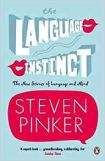The Language Instinct: The New Science of Language and Mind by Steven Pinker
| The Language Instinct: The New Science of Language and Mind by Steven Pinker | |
|
| |
| Category: Popular Science | |
| Reviewer: Magda Healey | |
| Summary: This book concerns language in general rather than any specific languages and it describes mechanics of language as well as making an extremely convincing, well presented and often entertaining argument in favour of the innate character of spoken language acquisition and development. Can work as a good introduction to evolutionary psychology in general, too. Recommended for anybody interested in the mind science or language in general but do not expect advice on usage. | |
| Buy? Yes | Borrow? Yes |
| Pages: 496 | Date: March 1995 |
| Publisher: Penguin Books Ltd | |
| ISBN: 0140175296 | |
|
| |
Have you wondered what colourless green ideas were doing* ? Admired Lear's and Carroll's nonsense? Didn't know why it was OK to say that Mel devoured pizza but not Mat devoured; and - on the contrary - why Mel can dine but Mat cannot dine pizza? Why walkmans and Mickey Mouses rather than Walkmen and Mickey Mice? Why pitter-patter and ping-pong but never patter-pitter and pong-ping? How a perfectly civil and positive letter of reference can, essentially, say 'don't hire the guy, he's useless'? Can we blame the genes for sloppy grammar? What happens when the brain is, literally, split in half?
Steven Pinker is a psychologist specialising in language development in children and in this book he writes about language: not English, Chinese or Navaho, but language in general, which encompasses all of the languages spoken on Earth as well as the underlying 'language engine' embedded inside our heads.
The book is passionate, well argued, erudite and full of what Pinker himself describes as torrent of relevant detail. The detail is taken from literature, linguistic, experimental psychology, neuroscience, genetics, poetry and what is often called 'real life' (as if all the others were somehow weightlessly imaginary).
Pinker's writing is eminently readable: lucid, clear and entertaining. He hovers somewhere over the line between relaxed literary and educated colloquial which makes his style reminiscent of what a good lecture should be like. It's learned but accessible, precise but not stifled, conversational but not rambling, sometimes humorous but never primitive, passionately committed but never irrational or unreasonable.
The book aims to offer an integrated analysis of the phenomenon of language. But there is more to it than a simple summary of the scientific discoveries. The whole work is a powerful argument for seeing language as a 'complex specialised skill, which develops spontaneously without formal instruction, qualitatively the same in every individual and distinct from more general abilities to behave intelligently'. In other words, for seeing language as an innate phenomenon, as an instinct.
The structure of the book is very clear and each of the chapters is devoted to a separate subject area; to the degree that virtually each of them could be enjoyable and informative even when read separately. There is also a comprehensive glossary included, comprising of obscure (X-bar theory, anyone?) as well as more commonplace (philosopher, adverb) terms.
I would say that the book could be read by a reasonably natural-science-literate 16 year old and it doesn't assume basic knowledge above A-levels, although of course people familiar with biology, linguistics, scientific psychology, cognitive science or even old-fashioned grammar will find it easier to read without a frequent need to consult the glossary. All in all it's an excellent popular science book, both informative and entertaining. If I was to recommend a book for a non-psychologist interested in the science of the mind, "The Language Instinct" would be in my top three.
Now to the content: what can we find on these 500 pages?
Pinker starts with the universality of language: all human societies talk (they also joke and create songs and poems, apparently) and they talk well - the myth that some languages are more primitive or that some dialects (for example spoken by working class Northerners or American ghetto blacks) are somehow inherently worse is one of the first myths that the book debunks. We all speak, and in the deep, structural sense, speak equally well. But then, the universality of language doesn't have to mean that it is innate, after all language is such a useful thing that it could have been invented from new many a time in human history. We don't use feet for eating but nobody claims that we have a special 'use-hands-for-eating' gene.
The rest of the book is a rich, powerful argument in support of the thesis that a mechanism for language learning is not only universal but innate, that Children actually reinvent it, generation after generation - not because they are generally smart, not because it's useful to them, but because they just can't help it.
One of the most important concepts introduced in the book is one of 'mentalese'. Mentalese is an universal, underlying language of the mind, related to, but different from, all natural spoken languages. It is used for thinking and it is from mentalese that the thoughts get translated into the words and phrases of natural languages. Pinker uses this concept to put to rest the hypothesis of linguistic determinism: language shaping the thought along the lines of 'what cannot be said cannot be thought about'. That is why Orwellian Newspeak will never remove certain concepts from people's heads. Concepts of freedom and equality are thinkable even if nameless. Mental life goes independently of particular language.
A lot of the book is devoted to the mechanics of language, and Pinker looks at it from the point of view of structure (Chomsky's generative grammar) as well as describing the underlying neurological and genetic basis. These chapters contain plenty of rather terrifying tree-diagrams, parsing charts and logical formulae as well as grammar and anatomical terms. However, the book is written in the way that actually allows for skipping the strictly technical stuff. Of course, the understanding gained in this way will be somehow shallower, but it is still possible to learn something even if all the graphs are skipped. And there are real gems of information and explanation here.
The effortless way with which children acquire language must have surely amazed any parent who ever stopped to think how complicated speaking actually is. Pinker shows how natural and good children are at talking (often by comparing them with adults learning foreign languages consciously) in comparison to their rather poor performance on many other mental and physical tasks, and demonstrates the logic of the whole process (including the errors that are made during learning). Did you know that three year olds are structurally correct in over 90% of their speech? Amazing! The book also shows why it makes sense to have a critical period for language learning (it seems virtually impossible to acquire language after early adolescence if none was learned before) and why input from other live human beings is needed for language acquisition.
The two closing chapters of the book are amongst my favourites. In fact, if you pick this volume up and are not sure if it's worth reading, go straight to the chapter titled 'Language Mavens'. It focuses on the difference between the rules of natural language as it is actually spoken, which are strictly adhered to by all people that use the particular dialect and the prescriptive rules that carefully delineate the way that the speech is supposed to be. Pinker is rather ruthlessly dismissive of the prescribers and he treats most of their rules as shibboleths, designed to differentiate between the elite and the 'uneducated masses'.
On the other hand he has a very sensible attitude to the practical proposition that people should learn the 'standard dialect' as socially useful and especially to improving the standards of the written prose. After all, written language is not an instinct. We are biologically designed to speak, but not write or read. Writing is a craft; a difficult one and one that 'needs practice, instruction, feedback and examples'.
The final words in the book go well beyond language and towards a theory of mind in general. The study of language is a perfect launching pad for an assault on the Standard Social Science Model which is a belief that human beings are born into this world as universal learning machines, infinitely malleable by culture and the environment. Pinker is one of the most passionate exponents of the opposing paradigm: evolutionary psychology, an approach that I personally find both fertile as a basis for research and strangely exhilarating as a view of the humanity.
The universal human nature which we all share, the fact that we came here equipped with sophisticated mental systems of which language is only one, albeit very significant one; the meta-culture that makes communication possible between an Eskimo, New Guinea highlander and an Oxford don; the hundreds of human universals from gossip and jokes to use of tools, from sex in private to fear of snakes, from laws against murder and rape to feasting and fondness for sweets: it all testifies to the fact that despite speaking superficially different languages we all have the same minds.
* Colourless green ideas were sleeping furiously.
 The Language Instinct: The New Science of Language and Mind by Steven Pinker is in the Top Ten Non-Fiction Books To Make You Think.
The Language Instinct: The New Science of Language and Mind by Steven Pinker is in the Top Ten Non-Fiction Books To Make You Think.
 The Language Instinct: The New Science of Language and Mind by Steven Pinker is in the Top Ten Books About Language.
The Language Instinct: The New Science of Language and Mind by Steven Pinker is in the Top Ten Books About Language.
Please share on: ![]() Facebook,
Facebook, ![]() Twitter and
Twitter and
![]() Instagram
Instagram
![]() You can read more book reviews or buy The Language Instinct: The New Science of Language and Mind by Steven Pinker at Amazon.co.uk Amazon currently charges £2.99 for standard delivery for orders under £20, over which delivery is free.
You can read more book reviews or buy The Language Instinct: The New Science of Language and Mind by Steven Pinker at Amazon.co.uk Amazon currently charges £2.99 for standard delivery for orders under £20, over which delivery is free.
![]() You can read more book reviews or buy The Language Instinct: The New Science of Language and Mind by Steven Pinker at Amazon.com.
You can read more book reviews or buy The Language Instinct: The New Science of Language and Mind by Steven Pinker at Amazon.com.
Comments
Like to comment on this review?
Just send us an email and we'll put the best up on the site.
Ruth Price said:
I wish I had read this review when I was wondering what else readers might like when reviewing Don't Sleep, There Are Snakes by Daniel Everett - this sounds just the ticket, as although that book was classified as travel, much of the content is challenging notions of language acquisition. I really want to read this one now, thanks to your splendid review, Magda!


